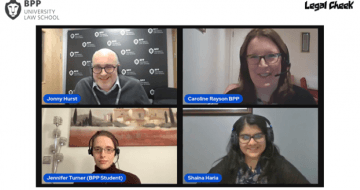Law training experts from BPP, Bird & Bird and Dentons demystify the new pathway to qualification under the SQE

With the launch of the new Solicitors Qualifying Examination (SQE) and fierce competition for jobs, a career in the legal sector might at first appear a confusing and somewhat daunting prospect for non-law students.
Last month, Jonny Hurst, a former City law firm partner turned BPP’s head of outreach and student recruitment, Rachel Boyle, early careers officer at Bird & Bird, and Rosie Buckley, early careers recruitment lead at Dentons, came together to demystify the new pathway to qualification for non-law students and share their top tips for breaking into the legal sector.
1. Build a strong foundation of legal knowledge
“Students from law and non-law backgrounds are indistinguishable when they start at the firm,” said Bird & Bird’s Rachel Boyle when reflecting on the outgoing PGDL to LPC pathway, a sentiment echoed by Jonny Hurst in his experience of teaching at BPP Law School. The panel agreed that this has been because non-law students have, under the Legal Practice Course (“LPC”), been required to complete a law conversion course before embarking on the LPC.
Dentons’ Rosie Buckley explained, “we want our trainees to be well-prepared and therefore we would still encourage non-law graduates to do the PGDL or Law Foundations Course”. Boyle added, “we really value a law conversion course — it puts people on the best footing”. So, under the new SQE regime, any non-law graduate who completes a PGDL or Law Foundations Course, should then have confidence to embark upon the SQE, the new standardised assessment required in order to become a qualified solicitor, in a similar position to their LLB peers. Jonny Hurst said he believes that those who attempt the SQE without either a law degree or a law conversion course behind them are taking a huge risk.
The SQE falls into two parts, known as SQE 1 and SQE 2. For SQE 1, wannabe solicitors must grapple with 360 multiple choice questions which test candidates’ ‘functioning legal knowledge’ spread over two papers that lasts a total of ten hours and six minutes. Then, SQE 2 puts this knowledge into a practical setting, assessing oral skills, such as interviewing clients and advocacy, as well as written skills, which include legal writing, drafting and legal research.
The SQE assessments are set “at a higher level”, said Hurst, who explained that the standard expected is that of “a day-one qualified solicitor rather than a day-one trainee”. This makes the strong foundation of legal knowledge (obtained in most cases through a law degree or conversion course) not only essential to success on the SQE, but also to making a strong start at any law firm.
2. Develop transferable skills
The other step to qualification is obtaining a total of two years’ qualifying work experience (“QWE”). The flexibility of QWE is a key differentiator from the LPC route which requires students to undertake a two-year training contract in order to qualify. Now, there is a wider range of work experience opportunities that can count towards completing your QWE, opening up alternative paths to qualification beyond doing a conventional four-seat training contract.
Obtaining your QWE will involve applying to organisations in the legal sector. Boyle and Buckley, with a combined two decades of experience in the sector, shared what they are looking for in applicants to their respective firms. “We [Bird & Bird] want diverse cohorts of trainees, not just a ‘cookie-cutter trainee’,” said Boyle. Similarly, Buckley said, “we [Dentons] are looking for people who think differently”, emphasising the importance of “problem-solving and changing the status-quo”.
It is the breadth of experiences that non-law students have that can make them very attractive to firms like Bird & Bird, where around 50% of their trainees have a non-law background and Dentons where the figure is around 40%. The panellists cited examples of students from STEM backgrounds such as engineering and medicine as well as career changers with previous experience in other sectors. Equally prized are those who have done part-time student jobs, had experiences abroad or participated in volunteering and pro bono activities.
This is because these experiences develop skills that are essential to being a good lawyer, such as teamwork, dealing with clients, working under pressure and developing commercial or technical knowledge in a particular sector. So, when applying, both Boyle and Buckley recommend that non-law students “think about all the transferable skills and think of all the advantages that brings”.
3. Don’t worry that you haven’t studied law when applying
The panel were keen to address the sense of imposter syndrome that non-law students can sometimes feel when considering a career in law. In fact, assessment centres and vacation schemes are all intended to be open to everyone and usually do not assume much (if any) previous legal knowledge.
Buckley stressed that “when assessing law and non-law candidates, we are looking to see what their potential is, rather than what legal knowledge they have”. Boyle added: “we just want people to perform at their best and all our vac scheme activities are so broad that you don’t need any prior legal knowledge”.
4. Be passionate
Passion seems to be an essential ingredient for getting your foot in the door at a law firm and making the most of your time there. “It’s all about passion and having an interest in working at Bird & Bird and being a lawyer,” said Boyle. This can be especially important on vacation schemes where students have an opportunity to explore their interests and network with lawyers and others on the scheme.
For applicants, however, it can be a struggle getting that passion across in a cover letter or application form. Boyle and Buckley agreed that students need to “do their research” and really understand the firm’s strengths.
Making an effort to get to know the firm is also important. Boyle explained: “if you can, do some in-person or virtual work experience, attend as many events as possible”. And it is clear that students should temper their passion with precision and clarity in their applications. Buckley reminded students “don’t forget to answer the question! You need to be able to clearly explain ‘why law?’ and ‘why Dentons?’”.
5. Be open-minded
Lastly, throughout your studies and when doing your QWE, the panel underlined the importance of being open-minded. “People don’t necessarily know where they want to qualify and where their skills best fit,” said Boyle. “We have lots of STEM students who think they are going to specialise in IP but then do something completely different!”. Accordingly, Buckley and Boyle recommend doing a mixture of contentious and non-contentious work, encouraging trainees to try something new. “The whole point of a TC [training contract] is to develop skills!” Buckley reminded the audience of over 200 students.
Being open-minded is even more important given the trend in the legal sector of broadening its training offerings. As Hurst pointed out, there is a growing variety of training contract/QWE programmes. These can include work in legal tech, and under the SQE regime, QWE can be in a single ‘seat’ which does not have to offer the trainee both contentious and non-contentious experience. Some of the new opportunities will be particularly attractive to students from non-law backgrounds who might have already developed skills in some of these areas.
About Legal Cheek Careers posts.



